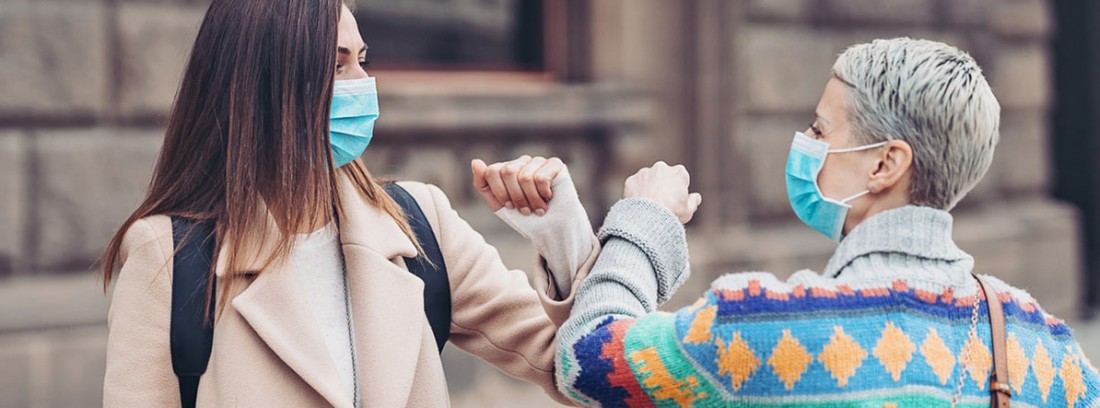Phobia of touching or being touched

What is the phobia of being touched called? Haphephobia
Haphephobia It is the irrational and persistent fear of touching or being touched by something or someone. Although it has become known due to, it already existed before, although it was very rare. It is part of the specific phobiasAlthough it has a very wide scope in everyday life, since the person feels constantly exposed to what they fear. Common situations such as pressing the elevator button, opening a door or giving two kisses to someone on the street can generate great anxiety, which makes the person avoid more and more situations.
Have a very negative impact on a personal, family, social and work level. In extreme cases it can lead to isolation.
Symptoms of hafephobia
Haphephobia produces symptoms on 3 levels:
- Physiological: Tachycardia, tremors, hyperventilation, sweating, tension, feeling of suffocation or dizziness ...
- Cognitive: Lack of concentration, emotional blocks and irrational thoughts in the face of phobic stimuli that revolve around infecting or infecting others, thoughts of imminent death, terror ...
- Behavioral: Refusal to touch or be touched in any of its forms, escape from feared situations, avoid people, lock up at home ...
Causes of haphephobia
The pandemic has changed our lives. The indications of social distancing prevent hugs, kisses and other forms of interaction, which has caused them to be reconceptualized as something dangerous. Touching is understood as a very real risk.
Also constant information about contagions in the media or in social conversations increases the feeling of danger. In addition, the fact that a clear end to the pandemic is not perceived further precipitates the haphephobic symptoms.
Relating to people with this fear makes it possible to replicate (vicarious learning), because we already know that fear is much more contagious than the virus. People with high levels of self-demand are also more likely to suffer from this phobia.
Fear of being touched by covid-19 increases
He has left great and with it a series of psychopathologies have emerged in some people, such as the fear of being touched for fear of being infected (hafephobia). But also other types of problems such as social phobia, cabin syndrome, ...
How to overcome it?
Some recommendations to handle the problem:
- Identify the origin of the problem and the consequences that it is reporting to you in your day-to-day life.
- Analyze What emotions and thoughts are involved in the behaviors you display to avoid fear. Learn to spot the negative thoughts that lead you to panic and redefine them so that you can cope with contact.
- make a list of all the things you have stopped doing and try to gradually expose yourself to them.
- Set small, manageable goals, and train them daily, it will help you gain a sense of control.
- Use or techniques to reduce anxiety throughout the day, outside of critical situations.
- If fear overcomes you,. Keep in mind that phobias are one of the main reasons for consultation, and they respond well to psychological treatment.
The importance of touch
The skin is the largest organ in the human body, making it a touch very powerful sensory modality, involved in many aspects of our day to day, even if we are not aware (for example, walking or eating).
Touch is the most primitive sense. It is the first to develop, and at the eighth week of gestation a fetus already has tactile sensitivity and begins to touch itself. At birth, touch is essential for survival, and is the key piece of neurocognitive development.
- It helps us to become aware of ourselves as individuals, separated from the outside world and is the sense with the greatest impact on our well-being.
- It protects us from potential danger through pain, which leads us to respond automatically.
- It has a fundamental role in communication. We bond and receive emotional information that we could not otherwise receive. It helps us define reality, and is basic in perception and semantic processing.
- It affects our decisions, opinions and behavior.
The haptic It is the study of everything related to contact and its effects on our perceptions.
- Haphephobia is the irrational and persistent fear of touching or being touched by something or someone. Although it has become known due to the pandemic, it already existed before, although it was very rare.
- Relating to people with this fear makes it possible to replicate, because we already know that fear is much more contagious than the virus.
- There are recommendations to face the problem, but if fear overcomes us, it is advisable to consult a psychotherapist, since phobias respond well to psychological treatment.
(Updated at Apr 14 / 2024)